牛津6A知识点
牛津6A基础知识汇总

牛津6A基础知识汇总Unit 1单词1:always总是 2:question问题 3:ask问请求要求 4:mean意思是意指 5:must必须应当 6:should应当应该7:shouldn’t=should not不应该 8:pick拾采9:public公共的公众 10:sign标志告示牌子 11:cousin堂(表)兄弟姐妹 12:danger 危险 13:away(离)开 14:grass草地草 15:bird鸟 16:cage笼子 17:quiet安静的 18:noise噪声喧闹声 19:smoke吸烟20:litter乱丢杂物 21:park停放(汽车)22:touch触摸 23:suddenly突然(地) 24:something某事某物 25:note钞票纸币26:around周围在附近 27:nearby附近的 28:quickly快地29:keeper看守人 30:point 指 31:fine罚款短语1. four years old 四岁2. ask Ben some questions 问Ben 一些问题3. go in 进去4. stay away 远离5. keep off 远离6. make noise 发出(喧闹)的声音7. talk about 讨论 8. public signs 公共标志9. No smoking 禁止吸烟 10. No littering 禁止乱扔杂物11. No parking 禁止停车 12. Do not touch 禁止触摸13. Danger! 危险 14. No eating or drinking 禁止吃喝东西15. Keep off the grass 远离草地 16. take a walk 散步17. Be quiet 保持安静 18. be back home from the zoo 从动物园回家19. a ten-yuan note 一张十元纸币 20. say to 对……说21. pick up 拾起 22. come up 上来23. point to 指向 24.look around环顾四周25. fine ¥10 罚款10元 26. birds’cage鸟笼27.walk on the grass 在草地上行走 28.ask sb about sth 问某人关于某事29.no one nearby 附近没有人 30.give me ten yuan=give ten yuan to me 给我十元 31.shake one’s head 摇头句型1:He is asking Ben some questions. 他正在问本一些问题。
牛津英语6A模块单元知识点总结
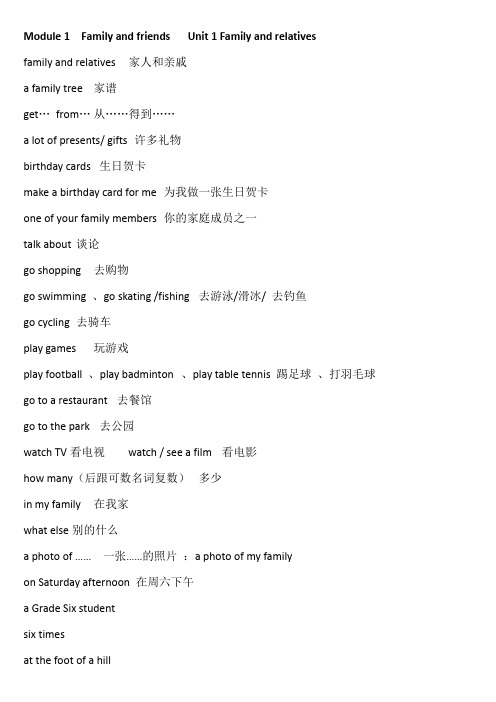
Module 1 Family and friends Unit 1 Family and relativesfamily and relatives 家人和亲戚a family tree 家谱get…from…从……得到……a lot of presents/ gifts 许多礼物birthday cards 生日贺卡make a birthday card for me 为我做一张生日贺卡one of your family members 你的家庭成员之一talk about 谈论go shopping 去购物go swimming 、go skating /fishing 去游泳/滑冰/ 去钓鱼go cycling 去骑车play games 玩游戏play football 、play badminton 、play table tennis 踢足球、打羽毛球go to a restaurant 去餐馆go to the park 去公园watch TV看电视watch / see a film 看电影how many(后跟可数名词复数)多少in my family 在我家what else别的什么a photo of ……一张……的照片:a photo of my familyon Saturday afternoon 在周六下午a Grade Six studentsix timesat the foot of a hillthis --- these ; that --- those;parents , daughter, son, uncle, aunt频率副词:always 、usually、often、sometimes、never 在be动词后,助动词后,情态动词后,实义动词Also “也”,用于句中;too“也”,用于句末;A lot of = lots of “许多,大量”,修饰可数名词复数、不可数名词Eg. a lot of / lots of water ; a lot of / lots of apples;。
牛津6A学习知识点情况总结

牛津英语6A 知识点总结一.名词☆可数名词:可数名词变复数的规则变化不规则变化☆不可数名词:a.b.c.d.e.g.注意:fish 鱼肉(不可数)fish 鱼(可数,单复同形)crab 蟹肉(不可数)crab 螃蟹(可数)☆量词:☆只能接_____________________:a few 几个few 几乎没有many 许多too many 太多☆只能接______________________:a little 一点little 几乎没有much 许多too much 太多too little 太少☆既可以____________________________________:some 许多any 许多plenty of = a lot of=lots of 大量的enough 足够的☆分类:1.___________________________: chicken steak sauages meat2.___________________________: fish crab prawns squid3.___________________________: ice-cream fish balls4.___________________________: milk eggs5.___________________________: chocolate crisps sweets6.___________________________: cakes biscuits bread small cakes7.___________________________: 7-up fruit juice coffee lemonade Coke8.___________________________: carrots onions tomotoes cabbages lettucespotatoes9.___________________________: peaches pineapples oranges pears bananas apples10.___________________________: rice noodles二.冠词☆不定冠词:带有a/an 的词组:a lot of 许多,大量a few 几个a little 一点have a rest 休息have a break 休息have a good time 过得愉快half an hour 半小时☆定冠词:the +形容词的最高级the tallestthe +序数词the second带有the 的词组:play +the +乐器演奏某种乐器in the morning/afternonn/evening 在早上/下午/晚上the same 相同的at the weekend 在周末all the rest 剩下的全部lay the table 摆好餐具on the left 在左边on the left of 在……右边on the right 在右边on the right of 在……左边go to the cinema 去看电影the USA 美国☆零冠词1.月份,星期,季节前2.三餐前3.play+球类4.by +交通工具5. 零冠词的词组:go to school 去上学at school 在学校at home 在家at noon 在中午at night 在下午on weekends 在周末best of all 所有当中最好的go skating 去溜冰go shopping 去购物三.数词☆基数词:表示数量☆序数词:表示顺序在第十层on the tenth floor☆百,千,百万百:hundreds of 数以百计的one hundred 一百two hundred 二百千:thousands of 数以千计的one thousand 一千two thousand 两千百万:millions of 数以百万的one million 一百万two million 两百万☆单位millimetre/er 毫米缩写:_______centimetre/er 厘米缩写:_______metre/er 米缩写:_______ kilogramme 千克缩写:_______ second 秒minute 分hour 小时四.代词☆人称代词:☆指示代词:五.形容词☆形容词的比较级和最高级变化:a). +er +estb). 以e结尾+r +stc). 重度闭音节结尾的,双写+er +estd). 辅音+y结尾的,y改成i+er i+este). 多音节词:more +多音节词most+多音节词特殊变化: good/well------______________------_________________much/many-----_______________-----________________bad------_____________________-----_________________☆句型结构:A 比B 更……A +be+比较级+than +BA最……A +be+the +最高级☆同义句转换:1.Danny is lighter than Peter.2.I am 150 cm. My brother is 180 cm.☆形容词的排序:限数描大形,新色国材名一张灰色的大圆桌_________________________________________________________六.副词☆频度副词:注意:位置:用于__________________时态☆方式副词:用来修饰动词或者动词词组在形容词后面加ly, 以辅+y 结尾,把y变i,再加ly1.loud---____________________2.quiet----_____________________3.slow---_____________________4.quick---_____________________5.happy---____________________七.介词☆表示时间的介词☆in+年,月,季节在一月份in Januaryon+具体的某一天(包括某一天的早上,下午或晚上)在周日on Sunday morning 在周日的晚上on Sunday evening at+时刻在一点十五at a quarter past five☆表示位置的介词1.live in (大地点) Ben and Kitty live in a housing estate.live on +楼层They live on the ninth floor.live at +具体的地点He lives at Flat 18B.2.arrive at(小地点)I'll arrive at Wanda Cinema at nine o'clock.arrive in(大地点)My father will arrive in Beijing tomorrow.3.on+岛屿on Hongkong Island4.in front of in the front of5.next to beside near6.There is a bird_______ the tree.There is an apple________ the tree.☆常用的介词短语1.what about=how about ……怎么样2.Write about 写关于……3.talk about 谈论4. tell sb. about sth. 告诉某人关于某事B. After系列1.look after 照顾2.After school 放学后3.run after 追赶C. For 系列1.be good for 对……有益2.be bad for 对……有害3.look for 寻找4.wait for 等待……5.cook food for people 给人们做饭6shop for food 去买食物7.get ready for…为…做准备8.It's time for +名词到……时间了D. From 系列come from=be from 来自于……E. Like 系列1look like 看起来像……2just like 就像……3.What's the weather like today? 今天天气怎么样?1play with sb. 和某人一起玩play with sth. 玩某物2.share sth with sb. 和某人分享某物3.be crowded with 挤满了…4make…with 用…来做G. Up 系列1.make up 化妆2.dress up 打扮3.grow up 生长H. To 系列1.sell things to people 卖东西给人们2. bring food to people 把东西带给人们3.bring sth to sb.4give sth to sb.5.show sth to sb6.want to do sth.7.need to do sth.8.one’s jurney to 某人去…的旅行9.a visit to…一次去、、、的旅行10fly to…= go to…by aeroplane 乘坐飞机去….I. of 系列1start of visit 参观开始2 end of visit 参观结束3.different kinds of food 不同种类的食物4.a list of foof 食品消费清单5. east of ……的东部6.the first day of Chinese New YearJ. On 系列1.go on a river trip 水上之旅2.go on a picnic 去野餐3.put on 穿上4.get on 上车5.stick…on…把、、、粘到、、、上6.on the pavement 在人行横道上7.on the zebra crossing 在斑马线上8on weekends 在周末9on one's way to 在某人去……的路上10on foot 步行11on the right 在右边☆介词短语后置介词短语后置,起到形容词的作用,来修饰前面的名词The children on page3 of this book are healthy.在书上第三页的孩子们很健康。
牛津6A知识点复习
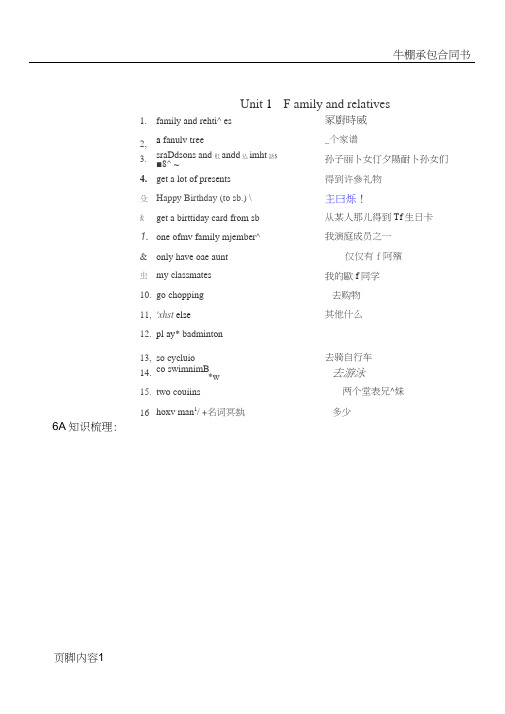
牛棚承包合同书页脚内容1Unit 1 F amily and relatives1. family and rehti^ es 冢廚時威2, a fanulv tree _个家谱3.sraDdsons and 肛andd込imht話$■8^ ~孙子丽卜女仃夕陽耐卜孙女们4.get a lot of presents 得到许參礼物殳Happy Birthday (to sb.) \主曰烁!&get a birttiday card from sb 从某人那儿得到Tf生日卡1.one ofmv family mjember^ 我演庭成员之一&only have oae aunt 仅仅有f阿殯虫my classmates 我的歐f同学10.go chopping 去购物11,'xhst else其他什么12.pl ay* badminton13,so cycluio 去骑自行车14. co swimnimB *w 去游泳15.two couiins 两个堂表兄^妹16hoxv man1/ +名词冥埶多少6A知识梳理:牛棚承包合同书语言点1. This is my grandfather.®是我的(外)祖父。
These are my lam ily and relatives.这些是我的家人和亲戚■>注意句中各成分保持单复数同形,2. T m their son.,我是他们的儿子&We:T re their sons.们杲他们的儿子*3. How many uncles do you hzx?你有多少个叔叔?How rn^y后面接可数名词的复数形式o4. What do you do with your...?你和你的”干什么?5. What else- do 丫口u do with your»?你和你的”还干什么?6. What else do you do with your»?你^你的”还干什么?With是个介词.后面接人称代词时!要用宾格的形式。
牛津英语6A知识点归纳

牛津英语6A知识点归纳Unit11.Nosmoking禁止吸烟2.Nolittering禁止扔杂物3.Noparking禁止停车4.Nocycling禁止骑自行车5.Noeatinganddrinking禁止吃喝6.keepoffthegrass不接近草坪7.Bequiet保持安静8.Donottouch不要摸9.climbtrees爬树10.ridebikes骑自行车11.takephotos拍照片12.gotothepark去公园13.gohome回家14.haveanicecream吃一个冰激凌15.havedinner吃饭16.watchTV看电视17.readone’sbooks读书18.playcomputergames玩电脑游戏19.gotobed睡觉20.alotof\alot大量的;许多21.publicsigns公共标志22.onthewall在墙上23.stayawayfrom…远离……24.walkonthegrass在草地上走25.thebird’scage鸟笼26.makenoise发出噪音27.takeawalk散步28.aten-yuannote一张十元的钞票29.lookaround四周看30.pickup捡起euptosb.走进某人Unit21.anewstudentinBen’sclass本班上的一位新学生2.gohometogether一起回家3.afterschool放学以后4.talkabout谈论有关……esoon快到了6.thethirdofMarch三月三日7.onthetwenty-secondofJuly在七月二十二日8.onthe18thofOctober在十月十八日9.yourbirthday你的生日10.Let’swaitandsee让我们等一下看看11.blowoutthecandles吹灭蜡烛12.asabirthdaypresent作为生日礼物13.birthdaycake生日蛋糕etomybirthdayparty来参加我的生日聚会15.haveabirthdayparty举办生日聚会16.aVCDofJapanesecartoons一张日本卡通光盘17.openthedoor开门18.makeabirthdaycard做一张生日贺卡19.takeoff脱下20.blowout吹灭21.apieceofpaper一张纸22.folditinhalf把它对折Unit31.SportsDay运动日2.allthestudents所有的学生3.beexcited非常激动4.veryexciting非常令人兴奋5.lookfor寻找6.arunningrace一场赛跑7.letmesee让我看看8.amomentago/justnow刚才9.ontheground在地上10.pickthemupforme帮我把它们捡起来11.infrontof在……前面12.nextto紧靠……旁边13.apairofglasses一副眼镜(单数)14.arolloffilm一卷胶卷(单数)15.threediaries三本日记16.apairofearphones一副耳机(单数)17.listentomusic听音乐18.yesterdayevening昨天晚上19.underthetable在桌子下面20.trytoremember试图记住21.intheredbox在红色盒子里22.closeyoureyes闭上你的眼睛23.playagame玩游戏24.withyourclassmates和你的同学们25.overthere在那边26.inmyschoolbag在我的书包里Unit51.NationalDay(国庆日)2.theNationalDayholiday(国庆假期)stweek/lastyear上个星期/去年4.aftertheholiday(假期后)5.gotoschoolearly(很早上学)/early--late6.intheschoolplayground(在学校操场上)7.beforeclass(上课前)/before--after8.watchafilmwithmyparents(和我的父母一起去看电影)/watched9.afunnycartoon(一部有趣的卡通片)/funny(形容词)10.visitafarmwithmyfamily(和我的家人一起参观农场)/visited11.onthefarm(在农场里)12.watertrees(浇树)/watered13.pullupcarrots(拔胡萝卜)/pulledupkcows(挤牛奶)/milked15.Thatwasfun!(那是件有趣的事!)/fun(名词)16.collecteggs(收集鸡蛋)/collected17.fruittrees(果树)18.pickalotoforanges(摘许多橘子)/picked19.tastethem(品尝它们)/tasted20.Wonderful!(太好了!)21.gotothefarm(去农场)/went22.attheweekends(在周末)23.watchcartoons(看动画片)/watched24.visitthezoo(参观动物园)/visited25.listentomusic(听音乐)/listened26.playfootball(踢足球)/played27.playvolleyball(打排球)/played28.cleanthehouse(打扫房子)/cleaned29.visitLiuTao’sgrandparents(拜访刘涛的祖父母)/visited30.campingtrip(野营旅行)31.atacamp(在一个营地上)32.walkinthemountains(登山)/walked33.cookalotoffood(做许多食物)/cooked34.playalotofgames(玩许多游戏)/played35.gocamping(去野营)/went36.plantflowers(种花)/planted37.haveagoodtime(玩得很高兴)/had Unit61.getveryexcited变得非常兴奋eafter在……之后到来3.NewYear'sDay元旦4.onNewYear'sDay在元旦5.atChristmas在圣诞节6.gotoparties去参加聚会7.haveabiglunch吃一顿丰盛的午餐8.atSpringFestival在春节9.WhatdopeopleusuallydoatSpringFestival?人们通常在春节干什么?10.visittheirrelativesandfriends拜访他们的亲戚和朋友11.eatlotsofdeliciousfood吃许多美味的食物stSpringFestival上个春节13.ofcourse当然14.myfavouriteholiday我最喜爱的节日15.inOctober在十月16.dressupincostumes用戏服装扮stHalloween去年万圣节18.Mid-AutumnFestival中秋节19.eatmooncakes吃月饼20.playwithlanterns玩灯笼21.watchthemoo赏月n22.thebeautifulmoon漂亮的月亮23.ondifferentholidays在不同的节日styear去年25.atEaster在复活节26.from…to从……到………27.listentohim听他讲28.inthegrass在草丛中29.apopularholid一个流行的节日ay30.inChina在中国31.inJanuaryorFebruary在一月或二月32.eatricedumplings吃粽子33.liketoplaywithlanterns喜欢玩灯笼34.eatchocolateeggs吃巧克力蛋35.makepumpkinlanterns制作南瓜灯笼36.givepresentstoyourfriends把礼物给你的朋友37.gotoBeijing去北京38.thisafternoon今天下午39.playwithballoons玩气球40.watchcartoons看卡通片29.openthepresents打开礼物41.singanddance唱歌跳舞42.hisconversationwithhisteacher他和他老师的谈话43.meetHelenintheplayground在操场上遇见海伦44.readabookaboutthefarm读关于农场的书45.visitafarmwithmyparents和我的父母亲一起参观农场46.thesameholiday相同的假日47.playwithfriends和朋友玩48.watchthedragonboatraces观看龙舟比赛Unit71.onthe25thofDece在12月25日mbe2.istmasDay圣诞日3.onChristmasDay在圣诞日4.im'sfamily吉姆一家人J5.inhisgrandparent'shouse在他爷爷奶奶的房子里6.Christmastrees圣诞树7.thepresentsundertheChristmastree在圣诞树下的礼物8.somany这么多9.fromgrandmother来自祖母10.openitforme为我打开它11.likedrinkingtea喜欢喝茶12.befrom来自13.Christmaspresents圣诞礼物14.atJim'shouse在吉姆家15.drawandwriteinthediary在日记上画和写16.gotothesupermarket去超市17.sitatthebackofthebus坐在公共汽车的后面18.getoff下车19.theseatinfrontofme在我前面的座位20.thewomanbesidehim在他旁边的妇女21.walktothedriver走向驾驶员22.afterlunch午餐后23.Youarewelcome.不用谢24.nexttotheblackboard紧靠黑板25.getmanypresentsonChristmasDay在圣诞节得到很多礼物26.attheback在……后部27.writehisdiary写他的日记28.undertheseat在座位下面。
译林牛津英语6A知识点汇总

6AUnit 1 The king ’s newclothes[词汇学习 ]1.long long ago= many yearsago 很久以前 ,用在一般过去时态中,谓语动词用过去式 .2.clever 聪明的反义词:foolish3.foolish adj.( 形容词 )愚蠢的 fool n (名词). 愚蠢4.through walkthrough 走过look through浏览ugh –laughs 短语:laugh at 嘲笑 laugh atsb.嘲笑某人反义词 :cry laugh 是出声的笑,而 smile 是微笑,常常是无声的笑7.wear-wears-wore 同音词:wherewear 指的是穿着的状态,动作意味性不强, puton 强调穿的动作8.tell –tells –telling-toldtell 是及物动词,后面常接双宾语,常用 tellsb. sth. 表示告诉某人某事 tell sb.about sth. ”告诉某人关于某事”9.each 近义词:every 短语: each othereach 修饰两个或两个以上的人或物,强调个体,而 every 修饰三个或三个以上的人或物,强调全体10.say-says-saying-said短语: say to sb. 对某人说say hello to sb. 向某人问好11.sentence 短语 : make sentences 造句 I can make a sentence with “clever ”12.quick 副词: quickly Liu Tao is quick ,you should run quickly.13.next 下一个反义词: last 上一个短语: next week 下周next time 下次 See you next time .Word 完美格式14.little 小的,年幼的反义词:big 近义词:small15.think –thinks –thinking-thought短语:think of想起 thinkhard 认真思考16.child 复数:children 短语: Children ’s Day 儿童节 theonly child唯一的孩子17. turn to 变成 Water turned into ice at last.短语归纳Story timelong longago 很久以前 newclothes 新衣服 one day 一天make ⋯..for ⋯⋯为⋯⋯.制作⋯⋯ try on 试穿 cleverpeople 聪明的人foolish people 愚蠢的人 walkthrough走过 a lot ofpeople许多人 in thestreet 在街道上 beautifulclothes 漂亮的衣服a littleboy 一个小男孩point at 指着⋯⋯.. Cartoon timeplay a game 玩游戏 tell a story 讲故事 eachstudent每个学生 on themountain 在山上 the nextsentence 下一句 an old man 一位老人livein 居住在 think hard 认真思考have to 不得不Grammar time一般过去式的用法1.一般过去式的概念:表示在过去某个时间发生的动作或状态,常与表示过去的时间状语连用。
牛津版小学英语6A知识点归纳总复习
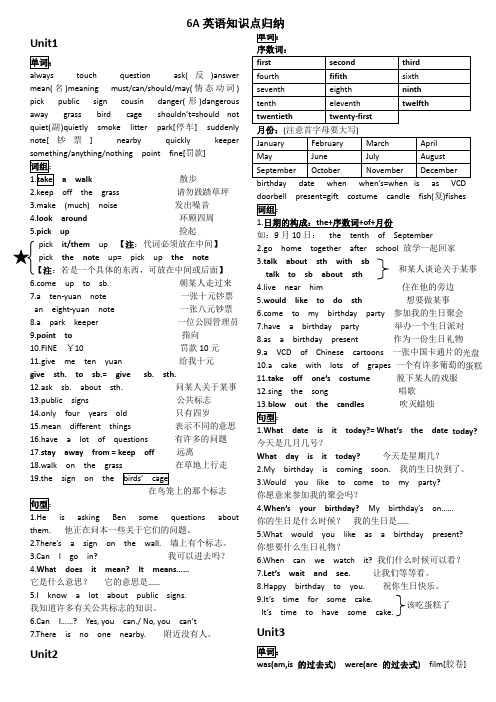
Unit1always touch question ask(反)answer mean(名)meaning must/can/should/may(情态动词) pick public sign cousin danger(形)dangerous away grass bird cage shouldn ’t=should not quiet(副)quietly smoke litter park[停车] suddenly note[钞票] nearby quickly keeper point fine[罚款]a walk 散步2.keep off the grass 请勿践踏草坪3.make (much) noise 发出噪音4.look around 环顾四周5.pick up 捡起pick it/them up 【注:代词必须放在中间】 pick the note up= pick up the note 注:若是一个具体的东西,可放在中间或后面】 e up to sb. 朝某人走过来 7.a ten-yuan note 一张十元钞票 an eight-yuan note 一张八元钞票 8.a park keeper 一位公园管理员 9.point to 指向10.FINE ¥10 罚款10元 11.give me ten yuan 给我十元 give sth. to sb.= give sb. sth.12.ask sb. about sth. 问某人关于某事 13.public signs 公共标志 14.only four years old 只有四岁15.mean different things 表示不同的意思 16.have a lot of questions 有许多的问题 17.stay away from = keep off 远离18.walk on the 在草地上行走 19.the sign on the在鸟笼上的那个标志1.He is asking Ben some questions about them. 他正在问本一些关于它们的问题。
牛津6A语法知识点
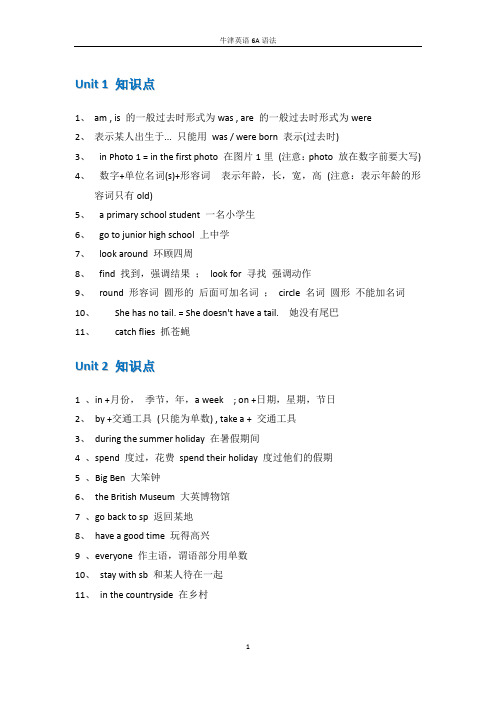
U n i t1知识点1、am , is 的一般过去时形式为was , are 的一般过去时形式为were2、表示某人出生于... 只能用was / were born 表示(过去时)3、in Photo 1 = in the first photo 在图片1里(注意:photo 放在数字前要大写)4、数字+单位名词(s)+形容词表示年龄,长,宽,高(注意:表示年龄的形容词只有old)5、 a primary school student 一名小学生6、go to junior high school 上中学7、look around 环顾四周8、find 找到,强调结果;look for 寻找强调动作9、round 形容词圆形的后面可加名词;circle 名词圆形不能加名词10、She has no tail. = She doesn't have a tail. 她没有尾巴11、catch flies 抓苍蝇U n i t2知识点1 、in +月份,季节,年,a week ; on +日期,星期,节日2、by +交通工具(只能为单数) , take a + 交通工具3、during the summer holiday 在暑假期间4 、spend 度过,花费spend their holiday 度过他们的假期5 、Big Ben 大笨钟6、the British Museum 大英博物馆7 、go back to sp 返回某地8、have a good time 玩得高兴9 、everyone 作主语,谓语部分用单数10、stay with sb 和某人待在一起11、in the countryside 在乡村U n i t3知识点1、for +breakfast / lunch / dinner (三餐前介词用for) 三餐的总称为meal2、What did you have for breakfast? 你早餐吃什么?3、health (名词:健康的意思) healthy (形容词:健康的) unhealthy (形容词:不健康的)That's not healthy. = That's unhealthy. 那是不健康的4、be important to ... 对...重要5、 a little 有一点、little 几乎没有(后面修饰不可数名词)a few 有一点,few 几乎没有(后面修饰可数名词的复数形式)6、should 应该(后面加动词原形)7、修饰可数名词复数和不可数名词的有:a lot of , lots of , plenty of , some , any , no , enough修饰不可数名词的有: much , a little , little修饰可数名词复数的有:many , a few , few8、not ... very often 不经常9、good eating habits 好的饮食习惯poor eating habits 不好的饮食习惯10、eat - ate 6 drink -drank11、and 连词“和”用于肯定句和一般疑问句or 连词“和”用于否定句,用于疑问句时表示选择U n i t4知识点1 、stop - stoppedstop to do sth 停下来去做另一件事,stop doing sth 停止做某事2、say -said3 、one of + 复数名词或复数人称代词宾格,作主语时,谓语部分用单数。
小学牛津英语6A知识点归纳

6A知识点归纳Unit1 Public signs1. Jack is only four years old but he always has a lot of questions. 杰克只有四岁,但他总是有许多的问题。
1) only表示“仅仅,只有”,这里用来强调Jack的年龄。
He is only child in this family. 他是这家唯一的孩子。
2) always“一直,总是”,常和一般现在时连用,放在play, eat, swim等实义动词前。
My mother always gets up at six in the morning. 我母亲总是早上六点钟起床。
3) a lot of “许多,大量的”,同义词组:lots of。
例如:There are a lot of/ lots of birds in the tree.树上有许多鸟。
2. He is asking Ben some questions about them. 他正在问本一些关于那些标志的问题。
1) 这句话用的是现在进行时,进行时的结构是:sb.+be+doing。
例如:They are watching TV. 他们正在看电视。
2) about表示“关于”,用来解释说明问的是那方面的问题。
Do you have any books about animals? 你有关于动物的书吗?3) ask sb. about sth. 问某人有关某事。
例如:I ask him about my work. 我问他关于我工作的事。
They ask me a lot of questions about Maths. 他们问我许多关于数学的问题。
3. They mean different things. 它们表示不同的意思。
1) different“不同的”,是same的反义词。
different是指两者以上才能构成不同的,所以其后要跟可数名词的复数。
牛津6A知识点
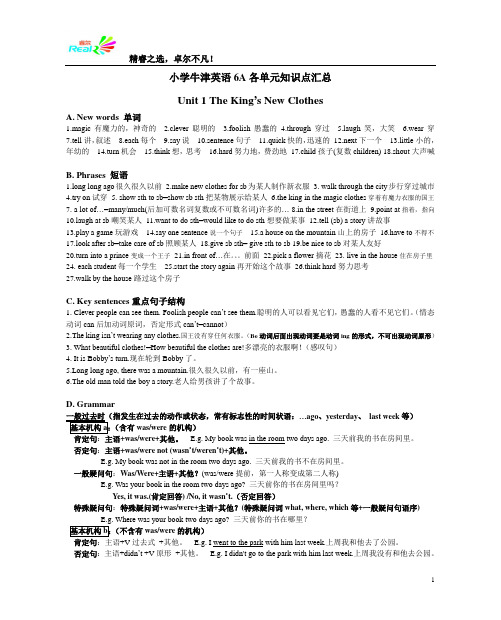
小学牛津英语6A各单元知识点汇总Unit 1 The King’s New ClothesA. New words 单词1.magic有魔力的,神奇的2.clever聪明的3.foolish愚蠢的4.through穿过ugh笑,大笑6.wear穿7.tell讲,叙述8.each每个9.say说10.sentence句子11.quick快的,迅速的12.next下一个13.little小的,年幼的14.turn机会15.think想,思考16.hard努力地,费劲地17.child孩子(复数children) 18.shout大声喊B. Phrases 短语1.long long ago很久很久以前2.make new clothes for sb为某人制作新衣服3. walk through the city步行穿过城市4.try on试穿5. show sth to sb=show sb sth把某物展示给某人6.the king in the magic clothes穿着有魔力衣服的国王7. a lot of…=many/much(后加可数名词复数或不可数名词)许多的…8.in the street在街道上9.point at指着,指向ugh at sb嘲笑某人11.want to do sth=would like to do sth想要做某事12.tell (sb) a story讲故事13.play a game玩游戏14.say one sentence说一个句子15.a house on the mountain山上的房子16.have to不得不17.look after sb=take care of sb照顾某人18.give sb sth= give sth to sb 19.be nice to sb对某人友好20.turn into a prince变成一个王子21.in front of…在。
牛津小学英语6A各单元 知识梳理
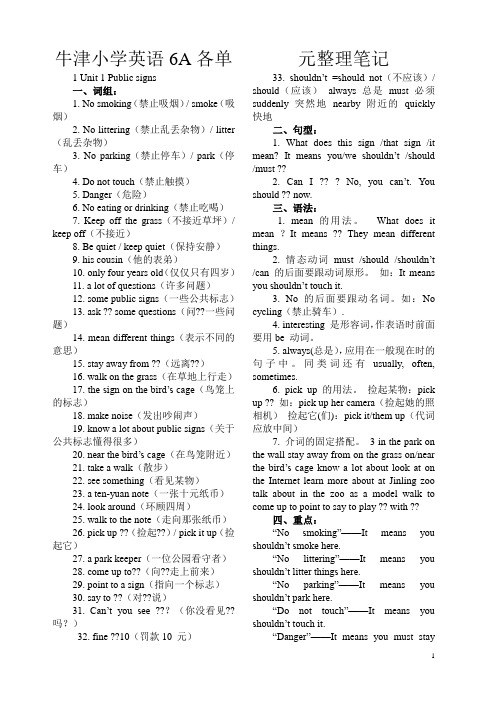
牛津小学英语6A各单元整理笔记1 Unit 1 Public signs一、词组:1. No smoking(禁止吸烟)/ smoke(吸烟)2. No littering(禁止乱丢杂物)/ litter (乱丢杂物)3. No parking(禁止停车)/ park(停车)4. Do not touch(禁止触摸)5. Danger(危险)6. No eating or drinking(禁止吃喝)7. Keep off the grass(不接近草坪)/ keep off(不接近)8. Be quiet / keep quiet(保持安静)9. his cousin(他的表弟)10. only four years old(仅仅只有四岁)11. a lot of questions(许多问题)12. some public signs(一些公共标志)13. ask ?? some questions(问??一些问题)14. mean different things(表示不同的意思)15. stay away from ??(远离??)16. walk on the grass(在草地上行走)17. the sign on the bird’s cage(鸟笼上的标志)18. make noise(发出吵闹声)19. know a lot about public signs(关于公共标志懂得很多)20. near the bird’s cage(在鸟笼附近)21. take a walk(散步)22. see something(看见某物)23. a ten-yuan note(一张十元纸币)24. look around(环顾四周)25. walk to the note(走向那张纸币)26. pick up ??(捡起??)/ pick it up(捡起它)27. a park keeper(一位公园看守者)28. come up to??(向??走上前来)29. point to a sign(指向一个标志)30. say to ??(对??说)31. Can’t you see ???(你没看见??吗?)32. fine ??10(罚款10 元)33. shouldn’t =should not(不应该)/ should(应该)always 总是must 必须suddenly 突然地nearby 附近的quickly 快地二、句型:1. What does this sign /that sign /it mean? It means you/we shouldn’t /should /must ??2. Can I ?? ? No, you can’t. You should ?? now.三、语法:1. mean 的用法。
牛津小学英语6A主要语法知识及单词词组句式

牛津小学英语6A主要语法知识一般过去时:定义:表示过去某个时间发生的动作或存在的状态,常与表示过去的时间状语连用。
如:yesterday,last night ,three months ago,just now,a moment ago,that night 等。
它的肯定形式:I was born in 1995. I watched cartoons last night.它的否定形式:Were you born in 1995? Yes , I was./No, I wasn’t一般疑问形式及肯(否)定回答:Did you watched cartoons last night? Yes, I did./ No ,I didn’t.特殊疑问形式:When were you born? What did you do last night?动词的过去式形式:a:规则动词的过去式词尾变化:1. 一般情况下加ed,如watered,planted2. 以不发音字母e结尾的加d,如:tasted。
liked,lived3. 以辅音字母+y结尾的变y为i,再加ed,study——studied4. 单音节,以一个元音字母和一个结尾的,双写这个辅音,再加ed,如:stop-stoppedb:规则动词的词尾读音:a) 在浊辅音和元音后读/d/,如:pulled ,wateredb) 在清辅音后读/t/,如cooked , milked ,asked , picked, walkedc) 在/t/和/d/音后读/id/,如:collected , tasted , pointed , studiedc:不规则动词的变化没有什么规律,需要大家背熟记牢:is/am–was are-were do-did have/has-had go-went make-made sit-sat get-got see-saw come-came swim-swam put-put eat-ate drink-drank fly-flew buy-bought run-ran drive-drove know-knew meet-met catch-caught ride-rode sing-sang speak-spoke say-said teach-taught take-took think-thought write-wrote give-gave begin-began tell-told hear-heard keep-kept draw-drew 代词分为两种:人称代词和物主代词。
译林牛津英语6A知识点
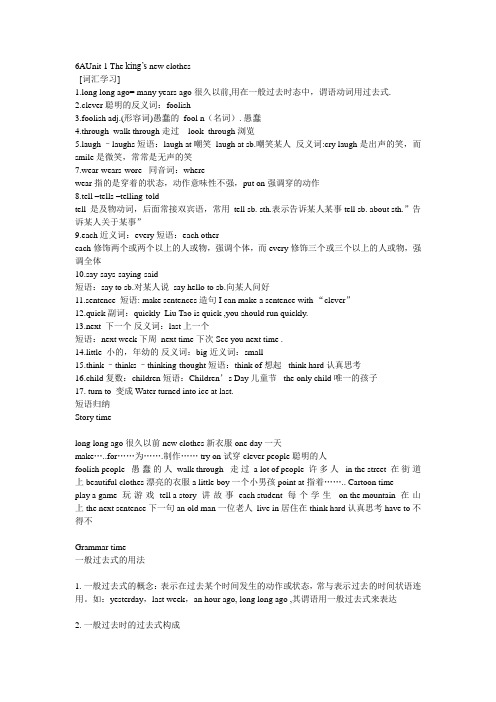
6AUnit 1 The king’s new clothes[词汇学习]1.long long ago= many years ago很久以前,用在一般过去时态中,谓语动词用过去式.2.clever 聪明的反义词:foolish3.foolish adj.(形容词)愚蠢的 fool n(名词). 愚蠢4.through walk through走过 look through浏览ugh –laughs 短语:laugh at 嘲笑 laugh at sb.嘲笑某人反义词:cry laugh 是出声的笑,而smile 是微笑,常常是无声的笑7.wear-wears-wore 同音词:wherewear指的是穿着的状态,动作意味性不强,put on 强调穿的动作8.tell –tells –telling-toldtell是及物动词,后面常接双宾语,常用tell sb. sth.表示告诉某人某事 tell sb. about sth.”告诉某人关于某事”9.each 近义词:every 短语:each othereach修饰两个或两个以上的人或物,强调个体,而every修饰三个或三个以上的人或物,强调全体10.say-says-saying-said短语:say to sb.对某人说 say hello to sb.向某人问好11.sentence 短语: make sentences 造句I can make a sentence with “clever”12.quick 副词:quickly Liu Tao is quick ,you should run quickly.13.next 下一个反义词:last 上一个短语:next week下周 next time 下次 See you next time .14.little 小的,年幼的反义词:big 近义词:small15.think –thinks –thinking-thought 短语:think of想起 think hard 认真思考16.child复数:children 短语:Children’s Day儿童节 the only child 唯一的孩子17. turn to 变成 Water turned into ice at last.短语归纳Story timelong long ago 很久以前 new clothes 新衣服 one day 一天make…..for……为…….制作…… try on试穿 clever people聪明的人foolish people愚蠢的人 walk through走过 a lot of people 许多人in the street 在街道上 beautiful clothes漂亮的衣服 a little boy 一个小男孩 point at指着…….. Cartoon timeplay a game 玩游戏 tell a story 讲故事 each student 每个学生on the mountain 在山上 the next sentence 下一句 an old man 一位老人live in 居住在 think hard 认真思考 have to 不得不Grammar time一般过去式的用法1. 一般过去式的概念:表示在过去某个时间发生的动作或状态,常与表示过去的时间状语连用。
上海牛津英语6A笔记

1.relative 〔’relətiv〕n. 亲属、亲戚2.a family tree 家谱3.family 〔’fæmili〕n. 家、家人families (复数)4.this → thesethat → those5.grandfather 〔’grænd, fa:ðə〕n. 祖父、外祖父6.grandmother 〔’grænd, mʌðə〕n. 祖母、外祖母7.an uncle 〔’ʌŋkl〕伯父、叔叔、舅舅8.an aunt 〔a:nt〕姑母、姨妈、阿姨9.brother 〔’brʌðə〕n. 兄弟sister 〔’sistə〕n. 姐妹10.cousin 〔’kʌzən〕n. 堂(表)兄弟、堂(表)姐妹11.their 〔ðεə〕pron. 他们的12.father parents 双亲mother13.granddaughter 〔’grændɔ:tə〕n. 孙女、外孙女14.grandson 〔’grændsʌn〕n. 孙子、外孙子1.have\has +过去分词(p.p)→现在完成时2.得到(原形)(过去式)(过去分词)get got got3. a lot of = lots of = plenty of = many 许多much4.present = gift 礼物5.birthday cards 生日贺卡6.get sth. from sb. 从某人那得到某物7.make sth. for sb. 做某物给某人8.one of your family members你的家庭成员之一9.How many uncles do you have? I have one uncle.你有几个叔叔?我有一个叔叔。
10.only 仅仅、只有11.I have one aunt, too. = I also have one aunt.我也有一个阿姨。
- 1、下载文档前请自行甄别文档内容的完整性,平台不提供额外的编辑、内容补充、找答案等附加服务。
- 2、"仅部分预览"的文档,不可在线预览部分如存在完整性等问题,可反馈申请退款(可完整预览的文档不适用该条件!)。
- 3、如文档侵犯您的权益,请联系客服反馈,我们会尽快为您处理(人工客服工作时间:9:00-18:30)。
牛津6A知识点M1Unit 1 Meet my familyfamily member家庭成员,Rose Garden Estate玫瑰花园住宅区,number数字only仅仅also 也live in the same flat住在相同的公寓live in different blocks住在不同的楼里older brother 哥哥younger sister 妹妹then然后know-knew give-gave给say-said 说know what to do知道做什么go to the supermarket 去超市,play football踢足球,go to the cinema去电影院=see a film看电影eat breakfast吃早饭do my homework watch television看电视walk in the park在公园里散步wash the dishes 洗盘子go to the beach去海边Sentences:1.I’m in Grade Six.- Which grade are you in ? 你在几年?2.-How many people are there in your family? (people本身就是复数)3.It’s time to go to bed.=It’s time for bed.该睡觉了4.That’s right.那是对的。
right 右、对的(反义词) left左/wrong错的Grammer:一、形容词比较级(两者之间) 句型:主语+动词+比较级+than+其它规则:1、直接在词尾加er; short-shorter2、以不发音e结尾的直接加r;nice-nicer3、以重读闭音节结尾,末尾只有一个辅音字母的要双写最后一个尾音字母加er;big-bigger /fat-fatter/thin-thinner(hot/sad/red)4、以辅音字母加y结尾的改y为i加er; heavy-heavier 重的My family is bigger than yours. 我家比你家大5.部分双音节或多音节词,在前面加-more beautiful-more beautiful 更漂亮二、一般现在时时间状语:always总是,(usually,often)经常,sometimes有时,never从不,every +时间,once a week 一周一次,twice a month 一月两次,three times三次频度副词放在be动词、实义动词前1.-I always go to the supermarket with my mum. 我总是和我的妈妈一起去超市-How often do you go to the supermarket with your mun?How often “多久一次”对频率提问2.He often washes the dishes. –What does he often do? 他经常干什么?三、问候语Nice to meet you.—Nice to meet you,too. 见到你也很高兴。
How do you do?—How do you do? 你好How are you?—I’m fine,thank you.M1 Unit 2 Good friendspuppy幼犬复数:puppies housing estate住宅区high-height n.身高weight体重n.weigh重v. 12 centimetres 12厘米kilogramme千克,together一起,cycle骑车=ride a bicycle heavy重的(反义词)light after school放学后share…with和…分享at/on the weekend在周末just like me就像我dress up打扮help each other互相帮助go to school together一起去上学be the same as 和……一样be different from 和……不同。
Sentences:1. How/What about you? 你呢?How/What about doing sth? 做某事怎么样eg. How about running?2. I like to do the things you do. 我喜欢做你做的事情。
I like to do the things my father does.我喜欢做我爸爸做的事情。
3.-How old are you? = What’s your age? -My age is ten.4.-What’s your height? - My height is 136cm.5. -How heavy are you?= What’s your weight? -My weight is 36kg.6.I’m Alice from Flat 2B. 我是来自于2B号公寓的Alice。
7.like to do sth =like doing sth I like to sing.= I like singing.8. Alice lives in Block in 3. Which block does Alice live in ?9.It’s time for sth.= It’s time to do sth. 该到做某事的时候了eg. It’s time for class.=It’s time to have class.M1 Unit 3 Let’s go!picnic area野餐区football pitch足球场bird aviary鸟语林,get to/ reacharrive (in+大地点、at+小地点) 到达East End Station东末车站People’s Square Station人民广场车站City Centre Station城市中心车站Dragon Bay Station龙湾车站want to do sth = would like to do sth想要做某事walk into 走进…look for something to eat找一些吃的东西please be quiet请安静welcome to…欢迎来到…write soon立刻回信,take some photographs拍照片everywhere 到处shopkeeper店主,enough money足够的钱,big enough 足够大bring sth with sb带着…plan计划talk to和…说话luck - lucky - luckily 幸运地Sentences:1.The birds are flying quickly. How are the birds flying?2. We are going to take a bus to the park. How are you going to the park?Grammer: 一、形容词变副词规则:1.直接加ly,quick-quickly 快地2.辅音+y 结尾y-i 加ly happy 副词happily play happily 玩的高兴二.一般将来时:构成be going to do sth 、will/shall do sth (shall 用于第一人称) 时间状语:tomorrow 明天,next +时间下个…,soon不久,this afternoon/evening今天下午/晚上They will go to Beijing tomorrow. Where will they go tomorrow?Module 2 Unit 1 People’s jobsfire-engine消防车,an astronaut宇航员pilot飞行员teach教-teacher老师fisherman渔民spacecraft宇宙飞船safe安全的(反义词) dangeroussick 生病的(反义词) healthy waiter 男服务员waitress 女服务员shop assistant 店员farm农场-farmer农民parents父母亲,dislike不喜欢put out fires灭火,fly a spacecraft开宇宙飞船,grow food种地,make sick people better使病人痊愈,sell things to people卖人们东西,bring letters to people给人们送信,cook food for people给人们做饭,drive-driver n.司机help make Garden City a safe place保护花园城市的安全,Sentences:1.What job does she do?=What’s her job?=What is she ?她是做什么的?2.-What do you usually do?你通常做什么?-I usually put out fires.3.-What does she want to be? 你想要成为什么?-She wants to be a doctor.4.Fishermen catch fish. 单数句A fisherman catches a fish.M2 Unit 2 My homekindergarten幼儿园7-Eleven shop便利店tennis court网球场an address地址telephone number电话号码,in front of在…的前面between…and在两者之间,on the right/left of在…的右/左边among(在三者以上之间) kitchen厨房cupboard 橱柜sitting-room 客厅live in Rose Garden Estate,live on the ninth floor, live at Flat 2BSentences:1. He lives in Block 1. Where does he live ?2. We live in the tallest floor. Who lives in the tallest floor?(“who”做主语谓语动词用单三)3.What’s your address? –I live at Flat 18B,Block 2.4.What’s your telephone number? –It’s 25292529.5. How many floors are there in your block?6. I live on the third floor. Which floor do you live on?Grammer:一、形容词、副词最高级的变化规则(用于三者或三者以上)1、直接在词尾加est;2、以不发音e结尾的直接加st;3、以重读闭音节结尾,末尾只有一个辅音字母的要双写最后一个尾音字母加est;(big-biggest/fat/thin/hot/sad/red)4、以辅音字母加y结尾的改y为i加est;5、多音节的词或部分双音节词直接在词前加most.(最高级前通常有定冠词the)主语+be+the+形容词最高级+范围(in/of)eg. She is the tallest in her class.Unit 3 My street叙述自己的上学路线p29(背会)crowded拥挤的,be crowded with挤满了traffic jam交通堵塞a lot of=lots of=plenty of+可数名词复数/不可数名词“许多”There are a lot of vegetables and meat in the basket . 篮子里有许多蔬菜和肉。
